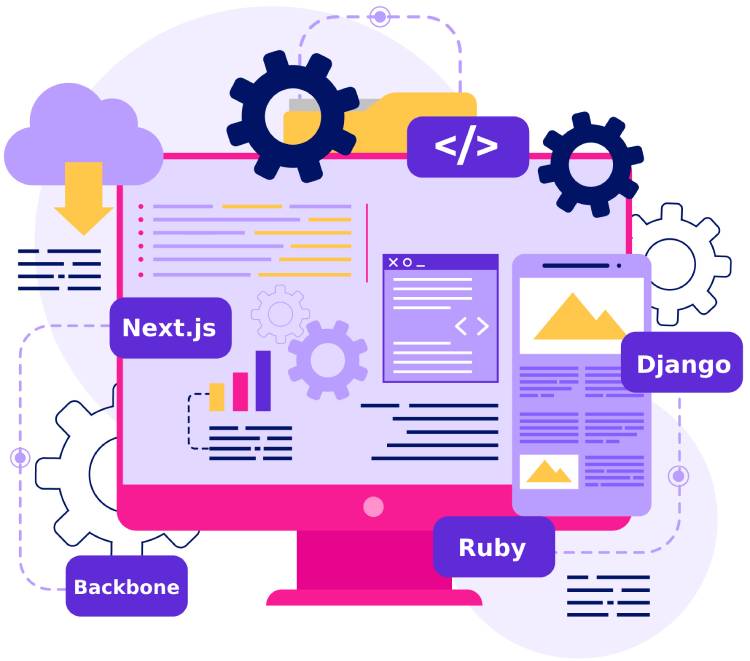Digital presence is the heart of business growth in this technology-first era and thus, choosing the best web development frameworks is the verified foolproof first step as it enables the right foundation to your digital transformation efforts.
Seeing you here I’ve got a feeling that you too are tired of re-creating new web-based applications everytime, draining humongous time & efforts. The idea of minimizing that spent on mundane tasks yet keeping the solutions consistently functional and highly scalable – that benefit of web development frameworks must have drawn you here. You’re at the right place mate!
We at BinaryFolks, with our development & consultation teams’ combined efforts, have conducted ground-level research on all the web development frameworks presently making rounds in the market. Then, we have carefully curated a list of the best web development frameworks in terms of three major metrics – how they simplify, speed up and add up to web programming productivity. Without further ado, let’s get started!

What are Web Frameworks?
To put it simply, web frameworks are pre-established sets of tools, libraries, and best practices that provide a structured way to build web applications. Technically, they offer a foundation for the developers to build reliable web solutions that are scalable & easy to maintain.
Why are Web Development Frameworks Important?
Now, the definition is clear. The next question is, why does it matter to mindfully make a choice among the best web development frameworks?
Because, the best part of web development frameworks is that they :
Provide the right mold to shape your development approach by offering resources, online services and web APIs
Majorly boost code reusability, maintainability, and scalability
Offer features like sessions, user authentication, and CMS creation for creating CRUD processes based clear separation between UI and business logic
So, as a result the development process can be more focused on creating the application’s user interface to catch & retain user attention,
and
The business logic for improving the offering altogether,
rather than having to create everything from the start.

Web Framework: Architecture
Web frameworks typically follow the Model-View-Controller (MVC) architecture, ensuring a clear separation of concerns between data, user interface, and application logic. This separation facilitates efficient development and easier maintenance. Here’s how it works!

Hot Benefits of using Web Frameworks, Mindfully!
- Pace and Operational Efficiency: Web frameworks speed up development, allowing developers to focus more on creating unique features rather than reinventing the wheel.
- Versatility and Modularity: They offer flexibility in choosing modules and integrating with various tools, making it easier to customize applications.
- Security & Data Integrity: Most frameworks come with built-in security measures, protecting the application from common vulnerabilities and ensuring data integrity.
- Community Support: Access to a supportive community of developers and users provides valuable resources, guidance, and solutions to common challenges.
- Scalability & Flexibility: Web frameworks offer scalability, enabling applications to handle increased traffic and data without compromising performance.
- Granular Testing and Debugging: They facilitate easier testing and debugging, ensuring smoother development cycles and higher-quality end products.
Types of Web Frameworks at a Glance
.png)
Frontend Frameworks
Front-end frameworks primarily focus on enhancing the user interface and user experience, enabling developers to create interactive and dynamic client-side applications. E.g. – React, Angular, and Vue.js

Backend Frameworks
Backend frameworks majorly concentrate on managing server-side logic, database operations, and request handling, facilitating the development of robust and scalable server-side applications. E.g. – Express.js, Django, and Ruby on Rails
Backend Vs Frontend Frameworks – Know the Difference
Digging into evaluating the best web development frameworks, just knowing the definition isn’t enough. Take a look at the key differences between front end and back end frameworks so you can prioritize right for choosing each!
| Point of Comparison | Frontend Framework | Backend Framework |
|---|---|---|
| Functional Independence | A frontend framework doesn’t have the ability to function on its own, independently – static sites are the only exception. | Backend framework works independently, regardless of the front end |
| Purpose | The purpose of the frontend framework is to enhance application’s accessibility & responsiveness across all popularly used devices like desktop, tablet, smartphones etc. | Backend framework eyes to ensure smooth functioning of application under a range of probable scenarios, while facilitating scalability, efficiency, and minimizing latency. |
| Developer’s Responsibility | Frontend developers are broadly responsible for designing and developing the face of the application based on the user's intention and intuition. | Backend developers are responsible for assisting the aesthetics of the frontend with functionality providing security and purpose (read, brain to the beauty). |
| Key Skill of Required For Quality Development | A good understanding of UI & UX | Strong ability to solve problems through logical reasoning & quick wit |
11 key Web Frameworks to Check Out Today
Here’s a list of 11 promising web development frameworks so your journey is accelerated, as we get you half a way through the intensive research with this detailed article!

Top 5 Frontend Framework

React
PROs:
- Virtual DOM for efficient rendering and improved performance
- Large community and extensive third-party library support
- Reusable components and easy integration with other frameworks.
CONs
- Steep learning curve for beginners
- Requires integration with additional libraries for a full-scale application.
- Complex state management without Redux or other state management tools.

Angular
PROs:
- Comprehensive framework with built-in tools for routing, forms, and state management.
- Two-way data binding simplifies development and reduces code.
- Strong corporate backing and robust community support.
CONs
- Steeper learning curve compared to other frameworks.
- Complex for smaller projects and may lead to over-engineering.
- Limited flexibility compared to other lightweight frameworks.

Vue
PROs:
- Lightweight and easy to integrate into existing projects.
- Simple syntax and gentle learning curve.
- Flexibility to scale from small to large projects effortlessly.
CONs
- Smaller ecosystem and community compared to React and Angular.
- Less corporate backing and enterprise adoption compared to other frameworks.
- Limited support for large-scale and complex applications.

jQuery
PROs:
- Simple and intuitive syntax for DOM manipulation and event handling.
- Cross-browser compatibility for smoother user experiences.
- Lightweight and easy to incorporate into existing projects.
CONs
- Callback-based programming can lead to complex and hard-to-manage code.
- Performance issues with heavy DOM manipulation and large-scale applications.
- Not suitable for complex single-page applications (SPAs).
.png)
Backbone.js
PROs:
- Lightweight and minimalistic, ideal for small-scale applications.
- Simplifies data manipulation and synchronization with the server.
- Easy integration with existing projects and libraries.
CONs
- Limited functionality compared to more comprehensive frameworks.
- Lack of two-way data binding can lead to more manual work for developers.
- Requires the use of additional libraries for routing and building complex SPAs.

Top 5 Backend Framework + 1

Express
PROs:
- Lightweight and minimalistic, perfect for building simple REST APIs.
- Lack of two-way data binding can lead to more manual work for developers.
- Requires the use of additional libraries for routing and building complex SPAs.
CONs
- Lack of built-in support for database integration and ORM.
- Limited scalability for large and complex applications.
- Requires manual configuration for certain advanced features.

Django
PROs:
- Rapid development with a comprehensive admin interface and powerful ORM.
- Versatile and scalable for both small and large applications.
CONs
- Opinionated structure and limited flexibility compared to more lightweight frameworks.
- Learning curve for developers unfamiliar with Python and Django's conventions.
- Not ideal for real-time applications and high-performance use cases.

Ruby on Rails
PROs:
- Convention over configuration approach for rapid development and reduced boilerplate code.
- Strong emphasis on developer productivity and ease of use.
- Integrated testing framework and active community for support.
CONs
- Slower performance compared to other lightweight frameworks.
- Limited scalability for high-traffic applications without proper optimization.
- Learning curve for developers unfamiliar with the Ruby language and Rails conventions.

Laravel
PROs:
- Elegant syntax and comprehensive documentation for easy learning.
- Built-in tools for authentication, caching, and database management.
- Active community support and a rich ecosystem of packages.
CONs
- Performance overhead compared to more lightweight frameworks.
- Limited scalability for high-traffic applications without proper optimization.
- Learning curve for developers unfamiliar with PHP and Laravel's conventions.

Flask
PROs:
- Lightweight and flexible, perfect for small-scale applications and APIs.
- Extensive control over application structure and development process.
- Easy integration with other technologies and libraries.
CONs
- Minimalistic features compared to more comprehensive frameworks.
- Requires manual configuration for certain advanced functionalities.
- Limited built-in support for complex database operations and ORM.

Bonus (+1) : Next.js
PROs:
- Built-in SSR (Server-Side Rendering) for improved SEO and performance.
- Automatic code-splitting for faster page loads and enhanced user experience.
- Seamless integration with React and easy deployment on Vercel.
CONs
- Requires a solid understanding of React fundamentals for efficient usage.
- More complex for smaller projects that don't require SSR or pre-rendering.
- Learning curve for developers new to Next.js and server-side rendering concepts.
Top Things to Remember when Choosing Web Frameworks
Having said that, a web framework works as a foundation for a digital tool or platform, it’s evident that its impact on the success and efficiency of your development process is significant. So before you get started with the action plan, take a quick look at the probable pitfalls. That way, you can go about choosing web frameworks in a foolproof way :
- Set the project requirements right, so you know exactly what to expect from the framework. Because then, you can directly map the features in terms of scalability, performance, and complexity with the framework’s capability
- Robust community support and comprehensive documentation availability is another major thing to look for when opting for a framework as it ensures better maintenance for your software with timely support, prompt updates, and troubleshooting resources ready at disposal
- Research about what the framework brings to the table so you’ll be better informed about the extent to which your framework can support high traffic & its consequences. The goal is to ensure it can handle the expected load without compromising speed and responsiveness
- Security clearly never goes out of the list as far as anything ‘online’ is concerned! Choose frameworks that have built-in security features to face cyber threats with a proactive approach to addressing vulnerabilities. Focus on data encryption, CSRF protection, and SQL injection for safeguarding your application the best possible way
- Evaluate learning curve and familiarity of the framework consider the team's familiarity with the technology stack. Finalize a framework that aligns with your team's comfort so that the development process can be expedited while reducing training overhead costs
- Room for flexibility and customization so that your software can play along with your versatile needs. With a tailored framework for the application in place, boundless growth is guaranteed
- Integration capabilities with third-party services & APIs, so that it blends well with your existing development ecosystem technically, leading to seamless execution of operations
- Community feedback and reviews so you learn from the horse’s mouth – knowing what worked for them & what did not. Learn from their experiences, challenges, and successes and analyze insights about the chosen framework's real-world performance
- License-related expenditure also makes for a crucial aspect to pay attention to, as a framework's licensing terms and associated costs have a big impact on the budget constraints. So, with the potential upgrade fees or additional charges required for using specific features and functionalities well noted, budgeting becomes convenient & factual
Until We Speak
It might feel a tad bit overwhelming to take a call among the best web development frameworks as they all are almost equally advantageous. The easiest 0th step you can take is to sit back and simply
Book a Consultation with Web Consultants
Who’ll dissect your business needs and core goals, in order to suggest the web framework that can potentially get all those covered.
The best part?
The first-round custom consultation comes for free!
Can’t wait to hear from you.
FAQs
Simply put, web development frameworks are a pre-built set of tools, libraries, and conventions attempting to streamline the entire web applications development process. The primary significance of frameworks is to save overall time, improve code quality, and ensure ethical practices & compliances while taking care of data security and system scalability.
While change is the only constant and the popularity of web development frameworks keep on changing. But considering the current situation, here goes the top ones :
- Front-end frameworks: React, Angular, and Vue.js
- Back-end frameworks: Express.js , Django, Ruby on Rails
- Full-stack frameworks: MEAN (MongoDB, Express.js, Angular, Node.js) and MERN (MongoDB, Express.js, React, Node.js)
Choosing the right framework depends on your project requirements, the expertise of your chosen development team, scalability needs etc. Alongside, programming language, documentation, community support, and plugins involved. So, evaluating your project's exact needs and outlining the features & thus a suitable framework.
Front-end frameworks are primarily focused on building user interfaces and managing client-side logic. They handle how the website looks and behaves in the user's browser. Examples include React, Angular, and Vue.js. Back-end frameworks are responsible for server-side functionality, managing databases, handling requests, and business logic. Examples include Express.js, Ruby on Rails, Django, and Laravel.
Yes, many web development frameworks are open-source, meaning they are freely available for anyone to use, modify, and distribute. Open-source frameworks often have strong community support and a wealth of resources. Examples include React, Angular, Express.js, Ruby on Rails, and Django.


